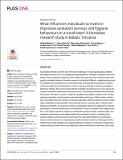| dc.description.abstract | Sub-Sahara African countries face immense challenges in ensuring adequate sanitation and hygiene behaviours to the rapidly growing populations. Attempts to address these challenges require empirical evidence to inform policy and planning. We contribute toward that goal by unveiling findings of formative research conducted in Babati, a rapidly growing town in Tanzania. We conducted a cross-sectional study involving 486 households, to unwind motives and barriers for individuals to invest in improved sanitation services and hygiene behaviour change. We used several methods including household survey, focus group discussions, behaviour observations and spot checks. The findings revealed that households derive their motivation to invest in improved sanitation and hygiene practices from comfort, raising social status, and the need for personal safety and privacy. Other motives include fear of penalties and fines and fear of disease outbreaks, whilst the barriers include, limited water availability and accessibility, environmental factors, property rights, cultural issues, financial constraints, and a person’s attitude. Quantitative data were subjected to multivariate analysis to identify determinants of households to invest in sanitation and hygiene practices. The logistic regression analyses revealed that sources of water, property rights, and education level were the main determinants of households to invest in sanitation and hygiene facilities, while household income was the main determinant for households to invest in both construction of handwashing facility and water treatment. We argue that the initiative to promote sanitation and hygiene behaviour change in small towns should focus on promoting motivation factors and abating the determinant factors identified in this study. | en_US |

